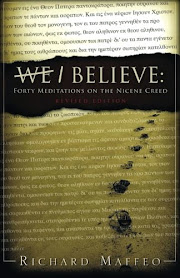Now let me challenge everyone to do something else. If we believe it is important to not only read the Bible, but to also let it guide our lives, then it should also be important that we memorize Scripture. And memorization is relatively easy with my plan. Here's my recommendation:
I commit myself to memorize at least one verse of Scripture a week. That computes to at least 52 verses of Scripture a year. That's a lot of God's word seeding your mind. Some people like to use 3x5 index cards, but I prefer business-card sized cards. They are easier to carry with me.
One the front of the card, write the Scripture reference. On the back, write the verse. As you memorize the text, first say (aloud) the reference, and then the text, and then repeat the reference. For example:
"Romans 5:8. But God proves His love for us in that while we were still sinners, Christ died for us. Romans 5:8"
And so, week One: I spend a few minutes each day rehearsing the text in my mind. By the end of a few days, I know it pretty well. At the end of the week, I can say it without hardly thinking about it.
Week two: I do the same thing with the next verse, but I also rehearse the verse from week one.
Weeks three and four, and following: I repeat the pattern, rehearsing all of the texts I have memorized over the preceding weeks.
After a while (and you will determine the time for yourself), I stop rehearsing the earlier verses because I know them so well. I usually return to them only once or twice in a month or so, just to keep them fresh. Most of the time I only carry with me a handful of cards . . . maybe ten or fifteen that I am actively committing to memory, or actively rehearsing.
How to select your memory verses?I find mine as I read the Scriptures. If a particular verse catches my attention, and I'd like to keep it in my mind, I memorize it that week -- or I add it to my list of verses I plan to memorize (my current list is nearly 30 verses long).
To get you started, here are several recommendations: Romans 5:8, 1 John 1:9, Revelation 12:11, John 3:16, 2 Chronicles 7:14, Joshua 1:8, Isaiah 53:5-6 (I know that's two verses, but often it is easier to memorize a couple of verses together when the thought flows better, than a verse in isolation).
God's word is "Living and active, and sharper than any two-edged sword." The Psalmist tells us God's word is "a lamp to my feet and a light to path." St. Peter exhorted, "Hunger for the sincere milk of the word, in order that you may grow thereby."
One verse a week is both manageable and, you will surely find, very profitable to your life.

